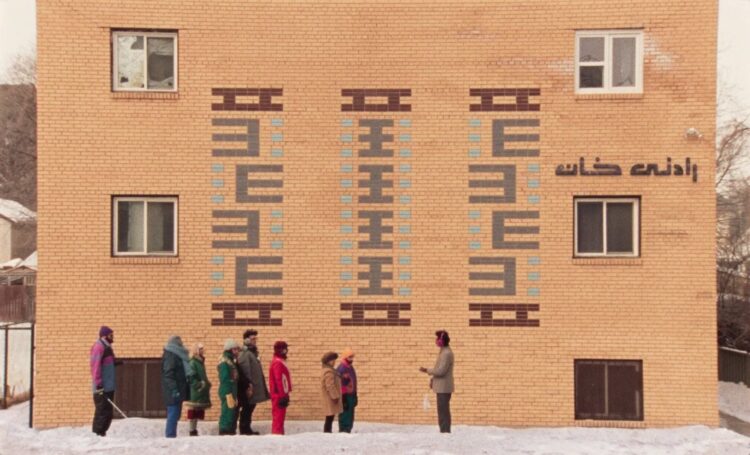
In Universal Language, a man makes a journey to his childhood home and meets the family now living there––these are at least the broad strokes. The director is Matthew Rankin, a Canadian filmmaker whose work usually requires less-basic terms. In his previous film The Twentieth Century, Rankin reimagined the life of Canada’s longest-serving prime minister, William Lyon Mackenzie King, through a lens of German expressionism: a trippy Brazil with a masturbation complex. Much of the casting was done either cross-gender or color-blind: “In a school play you can have a Filipino Captain von Trapp and a transgender Artful Dodger and it’s fine,“ Rankin explained at the time. ”In film, I don’t understand why there’s this pressure to always link an actor to their exact demographic profile.”
For Universal Language, Rankin takes that idea (commonplace in theatre, still somehow radical in cinema) to a different place: the Winnipeg of this film is, for wont of a phrase that doesn’t exist, culture-blind. The director has described it as a “Venn diagram of Winnipeg, Montreal, and Tehran,” though the influence of the Arab world is what comes through. The world of Universal Language appears like a parallel timeline: geographically, we’re in those Canadian cities, but Farsi is now the dominant language; the road signs and gravestones are in Arabic, too, and Tim Hortons is now a chain of tea houses. There are some clues as to why this has happened (we see a portrait Luis Riel hanging above a classroom and the currency now carries his name) but it is mostly take-it-or-leave-it case. Contrary to that exciting bustle of ideas, Universal Language‘s aesthetics are some of the most controlled in Rankin’s work. The film features diorama-like compositions that will call to mind both Wes and Roy Anders(s)on––a nice mix of the Texan’s sweet and the Swede’s dour––but any risk of twee is offset by the film’s naturalism and warmth: for all its surrealism, the world of Universal Language feels lived-in, and those lives feel consequential. It’s like nothing I’ve seen in Cannes this year.
For the story, Rankin follows two arcs that eventually meet. The first follows young girls Negin (Rojina Esmaeilie) and Nazgol (Saba Vahedyousefi), who discover a large banknote frozen in the ice on their way to Santoor lessons. Their classmate Omid (Sobhan Javadi) has misplaced his glasses, claiming to have tied them to a Turkey’s leg; this has been getting him in trouble at school, so Negin plans to retrieve the note to buy him a new pair. The second arc follows Matthew (played by the filmmaker himself), the aforementioned prodigal man returning to his hometown. Their worlds coalesce when Matthew offers to help with retrieving the money. He then meets the girls’ father: a tour guide, Massoud (Pirouz Nemati). In both narrative arcs you sense the poetic strains of a different kind of cinema: the girls’ morality tale and Matthew, the melancholy anti-hero, both seem drawn from the generation of Iranian filmmakers that gave us Abbas Kiarostami and Jafar Panahi. Everything from the film’s humanist energies, down to the timbre of the dialogue, rings like an endearing, never-labored homage to Persian cinema.
Universal Language does wonderfully to manage such a fine balancing act: the absurd jokes are still funny, yet only rarely do they break the film’s unique pitch. Reimagining Tim Hortons as an Arab tea house is a decent bit in itself, but it’s made far richer by the way Rankin leans into his conceit, granting some of his most delicate close-ups to the quiet gestures of serving and drinking. Working alongside DP Isabelle Stachtchenko, Rankin’s film is full of memorable images: there is a graceful shot that rises above the frozen money, a pink 500 Riel contrasting nicely in the white snow. There is a conversation filmed from the furthest walls of a sterile room, flipping back and forth between shots so that the characters seem to bounce from side to side, the mood landing somewhere between a Roy Andersson vignette and a tennis match.
It casts an unusual spell, one that only fades when Rankin’s jokes land a bit too easy; I’m thinking mainly of a sequence wherein Massoud brings a guided tour around the neighborhood’s “landmarks,” which plays with Kaurismäki levels of self-deprecating humor about the dreariness of Winnipeg; yet even this is saved by an endearing moment late on. Walking Matthew to his own apartment, Massoud explains, “I just like showing people things I care about.” The director is mining some family history here: the money in the ice was inspired by a story his grandfather (also a tour guide) used to tell. There is also a sequence when Matthew visits his father’s grave. (For all its ideas and oddities, it is a deeply personal film.) Through Stachtchenko‘s gorgeous 16mm cinematography, these people and their stories appear achingly cinematic: like Rankin’s slow dissolves of lovers embracing or the even-simpler romance of a bus leaving its station at dusk and snaking its way into the night. Universal language indeed.
Universal Language premiered at the 2024 Cannes Film Festival and will be released by Oscilloscope Pictures.
The post Cannes Review: Universal Language is a Beguiling, Surrealist Ode to Persian Cinema first appeared on The Film Stage.
from The Film Stage https://ift.tt/76cudt4

0 Comments